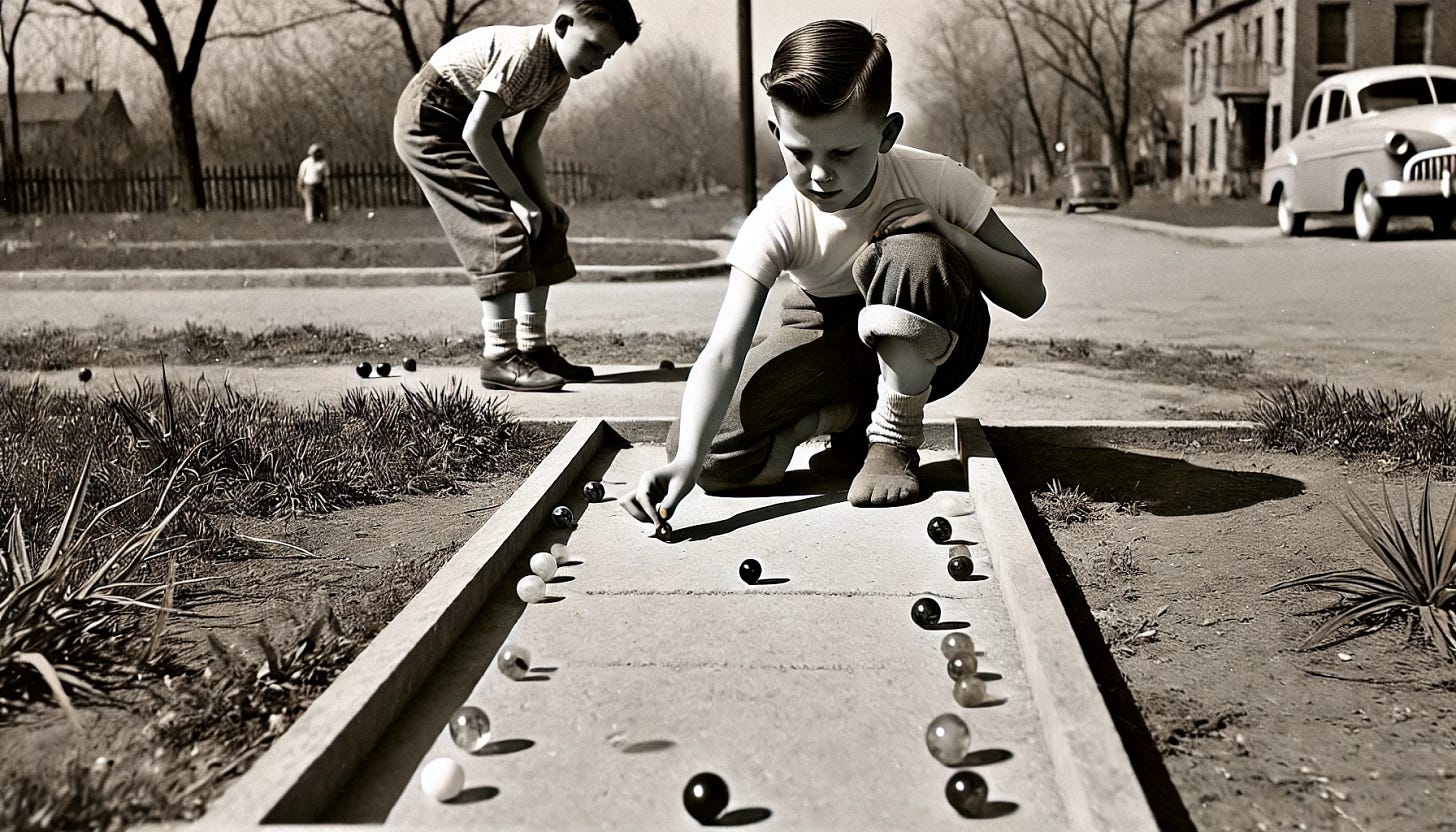When I was growing up, marbles were popular for a few years, mainly for a few months each spring. This was in the 1950s, and I wasn’t very old at the time. It seemed like marbles were a big thing at my school, and maybe across the city, the province, or even the whole country—I don’t really know. I’m not sure if the craze extended to the United States, but in Canada, marbles were definitely a springtime fad for a short period. Then, for some reason, it stopped. I suppose fashions change. Marble games were both games of skill and chance, and there was a bit of a gambling element involved.
We played different games with marbles. In one game, we made a small hole in the earth by stomping a heel into the dirt. Players would throw marbles toward the hole, and maybe the goal was to hit other marbles—I can’t quite remember the rules. I think if you hit a large marble, you could win it, but I’m not certain about that part.
Another game we played involved the big concrete sidewalks, which had cracks dividing them into sections. We’d use one of those sections, which might have been 8 or 10 feet long—this was before metric, by the way. We’d put a large marble at one end of the sidewalk section, a “boulder” with a star pattern, and that would be the target and the prize. Then someone would take a smaller marble and shoot it with their thumb in a specific technique, trying to hit the star boulder. If you hit it, you won the boulder. If you missed, you lost your marble. We probably lost and won quite a few bags of marbles that way. It wasn’t easy to hit that target all the way at the end of the concrete block.
Another thing we used marbles for was playing on boards we called marble boards. Later, I learned that Sir Francis Galton had actually used similar boards in the UK in the previous century to demonstrate probability. We either made these boards ourselves, if we were handy, or our parents—usually our dads—made them for us. The boards had a geometric pattern of nails hammered into them and were set at an incline. The marbles were dropped in through a chute at the top, also made of nails, and bounced around before landing in numbered slots at the bottom. I guess the numbers were set up probabilistically so you’d usually lose your marble, but once in a while, you might win others. I don’t remember the exact details, but I later learned that if you drop enough marbles through one of these boards, they form a normal distribution. We didn’t think about that sort of thing back then. We just called them marble boards. I later heard there were commercial versions, but I’m not sure if I ever saw one. I do remember making at least one myself with nails, a hammer, and what was probably a piece of pine.
We had different types of marbles and local names for them. The larger marbles were called boulders, and the smaller ones were just marbles. We also had ball bearings in both sizes—where they came from, I have no idea. I had a friend who couldn’t pronounce “ball bearings” and called them “ball-barians,” probably thinking that was their real name.
The glass marbles came in a variety of styles. Some were transparent with an interior design we called stars. The larger ones were the prized boulders. We also had opaque marbles, but they didn’t have a special name and weren’t as valued as the stars. The stars seemed to be rarer. Another type we had were “pures,” which were clear-colored glass. They were highly prized because they were fairly rare. I don’t remember any other types, just these two sizes—regular and boulder.
Like most childhood crazes, the marble fad eventually faded after a few years.




Those were the days! We dug cone shaped holes in the soil and aimed for them. On of my friends seemed to have a double jointed thumb that helped him flick his marbles in remarkable ways with added spin.
Thanks for the memory.
There were no concrete or other types of sidewalks where I grew up in the west end of Ottawa, from 45 to 55, and that was in the 1900, not 1800.
I remember playing marbles but remember best, the joy of collecting them.
We still have some in our Chinese checker board at the cottage.
I've rarely won against my wife, but as when I was much younger, I still get a kick out of holding them.
I must have been a pearl diver in some past life.